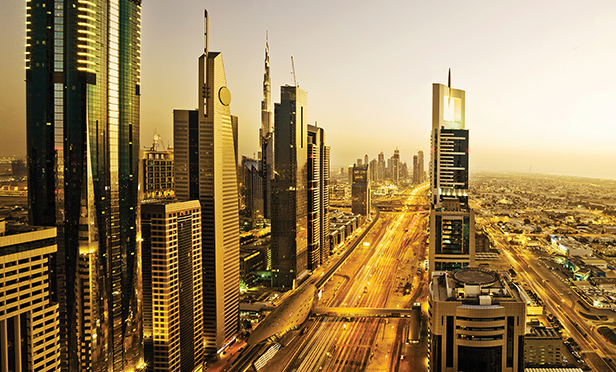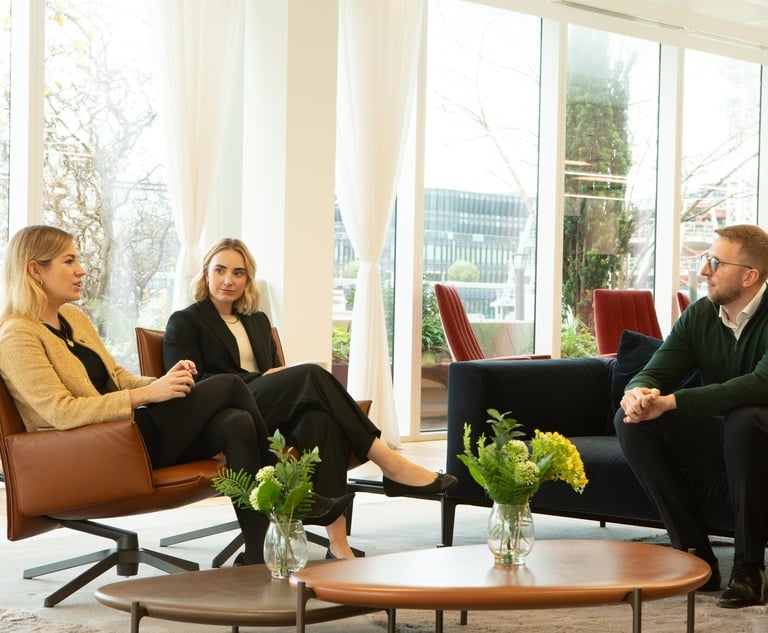Could the UAE Become the Next Major International Arbitration Hub?
Dubai and Abu Dhabi are quietly leading the Middle East onto a world stage led by historically dominant jurisdictions like London, New York, Paris and Hong Kong. But is the UAE ready to become the world's arbitration hub of choice?
July 15, 2020 at 11:33 AM
11 minute read
 Dubai in particular is carving its route onto the international stage.
Dubai in particular is carving its route onto the international stage.
The United Arab Emirates' (UAE) growing reputation on the international arbitration scene is gaining traction.
For so many years led by the established jurisdictions of London, New York, Paris, Hong Kong, and Singapore, the UAE is now helping the Middle East establish itself among the elites of world arbitration, anchored in a willingness to be open and competitive, and amenable to adopting established international protocols.
Alex Bevan, a partner in the international arbitration practice and Abu Dhabi office head at Shearman & Sterling, said the UAE was one of the jurisdictions to make the most progress on the world stage in the last 15 years. Since joining the New York Convention in 2006, it has positioned itself as a leading place to arbitrate, he said.
The creation of the the Dubai International Financial Centre (DIFC) as an independent arbitration jurisdiction separate from the onshore area, the launch of the Abu Dhabi Global Market (ADGM) as a new arbitration seat and the adoption of a new Federal Arbitration Law last year now mean the UAE offers a range of options to parties, regardless of where they are in the world.
But could the UAE soon be the world's premier international arbitration hub?
How it has grown
Today, the UAE leads international arbitration activity in the Gulf Cooperation Council (GCC), punching, as in so many other areas, well above its weight. Set up in 2004, the DIFC is its premier financial institution, and a 2008 DIFC Arbitration Law, based on UNCITRAL (United Nations Commission on International Trade Law) rules, followed.
Ten years later, a new UAE arbitration law was passed that further modernised the jurisdiction's scope.
Meanwhile, over in Bahrain's, Manama hosts the Bahrain Chamber for Dispute Resolution (BCDR), set up in 2009, while the Saudi Centre for Commercial Arbitration (SCCA) has been operating since 2016.
Established in 2013, the ADGM has become a competitor to the DIFC. Like the DIFC, which relaunched its relationship with the London Court of International Arbitration (DIFC-LCIA) in 2014, ADGM's English-language common law courts have proved attractive to international business.
"Over the past 15 years or so, there's just been a massive amount of construction and infrastructure development here"
Through these movements, the region has, albeit incrementally, grown into a thronging centre for the world's biggest international arbitrations.
"The ADGM in particular is showing real progress in this space," Shearman's Bevan said. "The creation of the ADGM Arbitration Centre has attracted the ICC to establish its Middle East base there, and [it] has implemented a series of thought leadership initiatives, such as the ADGM Arbitration Guidelines, launched in 2019.
"While there have been attempts to modernise arbitration venues elsewhere in the [region], with the establishment of new institutions and the updating of new arbitration laws, the UAE (and particularly with ADGM and DIFC) is really the only jurisdiction or set of jurisdictions between Europe and East Asia that has done so successfully, and is now firmly positioned as the place to arbitrate in the Middle East."
Growing still
Much of this recent growth has sprung from intra-nation competition.
In the decade running up to the global financial crisis (GFC) in 2008, seats like the Dubai International Arbitration Centre (DIAC) and the Abu Dhabi Commercial Conciliation and Arbitration Centre (ADCCAC) were outgrowths of chambers of commerce in the emirates, and were not the only ones to so emerge.
Thomas Wilson, head of Middle East construction and arbitration and UAE managing partner at Squire Patton Boggs, said that DIAC was a leading global arbitral institution in 2009-10, by caseload.
"[However,] of those 1,000 or so cases filed in a given year, the overwhelming majority were of relatively small amounts in dispute," he said, often being related to retail real estate transactions.
GCC countries have sought vainly to keep pace with the UAE. "Certainly, Bahrain has its own arbitral institution that's prominent and well-regarded. Saudi Arabia has much more recently developed the SCCA. Importantly, Saudi Arabia, the UAE and Qatar, in the last five years or so, have all come forth with newer arbitration laws that apply onshore, that are more reflective of international practice," said Wilson.
Problems continuing
As the region's international arbitration scene continues to flourish, international law firms have prospered.
"I would say that, anecdotally speaking, particularly for the types of firms that have substantial practices specialising in international arbitration, the international arbitration practices in those firms tend to be, in my estimation, some of the more substantial, or among the most substantial revenue and profit generating practices in [those] firms," said Wilson
"For larger, international firms and firms driven by achieving financial metrics, at the top of the industry, international arbitration is a critical practice component. One: it tends to drive substantial revenues and profits for those firms. And two: it is a practice area that is necessary to serving the types of clients that firms like ours and other large international firms want to serve."
"To become a global heavyweight, you need to develop as a seat of choice, rather than necessity"
Today, in the Middle East, construction and infrastructure dominate arbitration, Wilson said, taking up an outsized percentage of the arbitration business in the Middle East, compared to other regions.
"That's been driven by the huge infrastructure investment necessary to diversify these economies. Over the past 15 years or so, there's just been a massive amount of construction and infrastructure development here," he said.
"The reality is that the COVID-19 situation has brought to light a number of projects and resulting disputes with delays arising from force majeure…. Examples include the contractor not being able to bring their work staff onto construction sites, [causing] delays. There's a significant amount of projects and [problems are] continuing," said Alain Farhad, head of Mayer Brown's UAE dispute resolution practice.
Dubai leading the charge
Mat Heywood, formerly of Clyde a& Co, and now head of new Abu Dhabi-based dispute resolution practice, Mantle Law, said three seats had emerged in the UAE. "What we are seeing is the rise of new arbitration centres more suited to the locality in which the contracts and disputes are formed," he said.
ADCCAC in Abu Dhabi, and DIAC and the DIFC-LCIA in Dubai were seeing the majority of local disputes going through the local arbitration rules and centres, he said. "ICC still plays a big part, as does LCIA, but we have seen over the years a boom in the use of the local centres as forums for dispute resolution."
He said the ADGM had invested a lot of time, effort, and money in establishing the ADGM courts, one of the first, if not the first, fully digital court systems in the world. "Coupled with that, you have the Abu Dhabi arbitration rules, and given the amount of contracts connected to Abu Dhabi companies, we are seeing more ADGM arbitrations as well. Dubai is leading the charge, but Abu Dhabi is following closely."
Mayer Brown's Farhad believes "there has been, in the past 15 years, a push towards making Dubai one of the world's global hubs for international arbitration." He adds: "Those countries that develop a reliable arbitration system… are perceived as giving a safe place to investors and businesses for dispute resolution."
"Dubai is leading the charge, but Abu Dhabi is following closely."
Sachin Kerur, Head of Middle East at Reed Smith, thought the UAE's 'arbitration infrastructure' was one of the real success stories in the region, both in terms of the law, but also the range of disputes being heard. He too agrees that Dubai is leading the charge for the Middle East.
"Although Dubai doesn't have the same historic profile as London, Paris, and latterly Hong Kong or Singapore, it's a very credible and worthy contender as a global arbitral venue.
"The UAE has built a very strong ecosystem around arbitration. I think it's been very well done. You can always look for improvement, of course, but I think the effectiveness of the venue is there to be seen."
International competition
As it makes its foray onto the international stage, the UAE will find itself up against fierce, more established jurisdictions.
Squire's Wilson said many of the leading international seats for arbitration were important because bar associations and other promotional organisations in those locations had set out to make them prominent, while some stood out for historical reasons, or a combination of both.
"Certainly, London and Paris are two of the leading seats in the world, and certainly the most prominent in Europe. Cairo is a historically a substantial centre for arbitration. Singapore is a key seat; Hong Kong has been key seat, but developments there might lead to a change over time. Sydney has sought in the last few years to market itself as a leading seat… [although I'm not sure they've been successful]."
He said New York was also a key seat, as was Washington DC, especially due to investment arbitrations at the International Centre for the Settlement of Investment Disputes (ICSID). "Miami is becoming a key seat, in my opinion, especially for disputes arising out of Latin America," he said.
He added that "Mauritius has seen some activity in the last dozen years or so", "deriving from its growing prominence as an offshore jurisdiction for Africa."
Harsh Consequences
Ahmed Ibrahim, managing partner, Middle East and Africa, at Fenwick Elliott, said Cairo was an arbitration-friendly jurisdiction, and that the Cairo Regional Centre for International Commercial Arbitration was a world-class institution.
"Egyptian arbitration lawyers have [an] excellent international reputation," he said.
"[O]ne of the axiomatic points around the use of arbitration to resolve commercial disputes [is the] finality of the process. [This] is one of the selling points," said George Burn, partner and co-leader, international arbitration at BCLP in London, whose recent survey found widespread opposition to the introduction of an appeals process in international arbitration.
Arbitration was not mediation, said Farhad; disputes were decided in accordance with the rules of law. "You have no obligation or power, in fact, to decide things based on equity; it's not a mediation. You don't try to find a compromise between the parties, or a mid-way solution.
"If the law has harsh consequences for one of the parties, that's the way it has to be."
A new world leader?
While recognising progress, practitioners hesitate to rank the UAE in the top global echelon just yet.
"As a country of particular relevance to international arbitration, the UAE ranks much higher than you would probably initially think from either the size of its economy on a GDP basis, or its population," said Wilson.
The instance of interstate commerce and interstate economic activity in the UAE was incredibly high, he said, creating a good environment for arbitration work, leaving it best-placed regionally to grow into a leading role.
He wonders whether that is because it is popular for people from other countries to choose, or whether just because many of the arbitrations that are generated in the UAE happen to have the UAE seat.
"I'd say it's more the latter than the former," he said. "To be fair, it's nowhere near as popular as a seat of choice as many of the other leading [international] hubs.
"To become a global heavyweight, you need to develop as a seat of choice, rather than necessity."
Read More
Destination Africa: The Rise of Arbitration Across The Continent
Lawyers Oppose Introducing Arbitration Appeals Process, Survey Reveals
This content has been archived. It is available through our partners, LexisNexis® and Bloomberg Law.
To view this content, please continue to their sites.
Not a Lexis Subscriber?
Subscribe Now
Not a Bloomberg Law Subscriber?
Subscribe Now
NOT FOR REPRINT
© 2025 ALM Global, LLC, All Rights Reserved. Request academic re-use from www.copyright.com. All other uses, submit a request to [email protected]. For more information visit Asset & Logo Licensing.
You Might Like
View All
Paul Weiss Says Progress Means 'Embracing the Uncomfortable Reality'
5 minute read

GCs Say They are Getting 'Edged Out' of UK Boardrooms
Law Firms Mentioned
Trending Stories
- 1FTC Launches Inquiry of Single-Family Rental Home 'Mega Investors,' Issues PBM Report
- 2Womble Bond Dickinson's Wilmington Office Sees New Leadership as Merger Is Completed
- 3Defending Against a $290M Claim and Scoring a $116M Win in Del. Drug Patent Fight
- 4Jury Awards $6.2 Million in Walmart Slip & Fall
- 5'If the Job Is Better, You Get Better': Chief District Judge Discusses Overcoming Negative Perceptions During Q&A
Who Got The Work
J. Brugh Lower of Gibbons has entered an appearance for industrial equipment supplier Devco Corporation in a pending trademark infringement lawsuit. The suit, accusing the defendant of selling knock-off Graco products, was filed Dec. 18 in New Jersey District Court by Rivkin Radler on behalf of Graco Inc. and Graco Minnesota. The case, assigned to U.S. District Judge Zahid N. Quraishi, is 3:24-cv-11294, Graco Inc. et al v. Devco Corporation.
Who Got The Work
Rebecca Maller-Stein and Kent A. Yalowitz of Arnold & Porter Kaye Scholer have entered their appearances for Hanaco Venture Capital and its executives, Lior Prosor and David Frankel, in a pending securities lawsuit. The action, filed on Dec. 24 in New York Southern District Court by Zell, Aron & Co. on behalf of Goldeneye Advisors, accuses the defendants of negligently and fraudulently managing the plaintiff's $1 million investment. The case, assigned to U.S. District Judge Vernon S. Broderick, is 1:24-cv-09918, Goldeneye Advisors, LLC v. Hanaco Venture Capital, Ltd. et al.
Who Got The Work
Attorneys from A&O Shearman has stepped in as defense counsel for Toronto-Dominion Bank and other defendants in a pending securities class action. The suit, filed Dec. 11 in New York Southern District Court by Bleichmar Fonti & Auld, accuses the defendants of concealing the bank's 'pervasive' deficiencies in regards to its compliance with the Bank Secrecy Act and the quality of its anti-money laundering controls. The case, assigned to U.S. District Judge Arun Subramanian, is 1:24-cv-09445, Gonzalez v. The Toronto-Dominion Bank et al.
Who Got The Work
Crown Castle International, a Pennsylvania company providing shared communications infrastructure, has turned to Luke D. Wolf of Gordon Rees Scully Mansukhani to fend off a pending breach-of-contract lawsuit. The court action, filed Nov. 25 in Michigan Eastern District Court by Hooper Hathaway PC on behalf of The Town Residences LLC, accuses Crown Castle of failing to transfer approximately $30,000 in utility payments from T-Mobile in breach of a roof-top lease and assignment agreement. The case, assigned to U.S. District Judge Susan K. Declercq, is 2:24-cv-13131, The Town Residences LLC v. T-Mobile US, Inc. et al.
Who Got The Work
Wilfred P. Coronato and Daniel M. Schwartz of McCarter & English have stepped in as defense counsel to Electrolux Home Products Inc. in a pending product liability lawsuit. The court action, filed Nov. 26 in New York Eastern District Court by Poulos Lopiccolo PC and Nagel Rice LLP on behalf of David Stern, alleges that the defendant's refrigerators’ drawers and shelving repeatedly break and fall apart within months after purchase. The case, assigned to U.S. District Judge Joan M. Azrack, is 2:24-cv-08204, Stern v. Electrolux Home Products, Inc.
Featured Firms
Law Offices of Gary Martin Hays & Associates, P.C.
(470) 294-1674
Law Offices of Mark E. Salomone
(857) 444-6468
Smith & Hassler
(713) 739-1250









